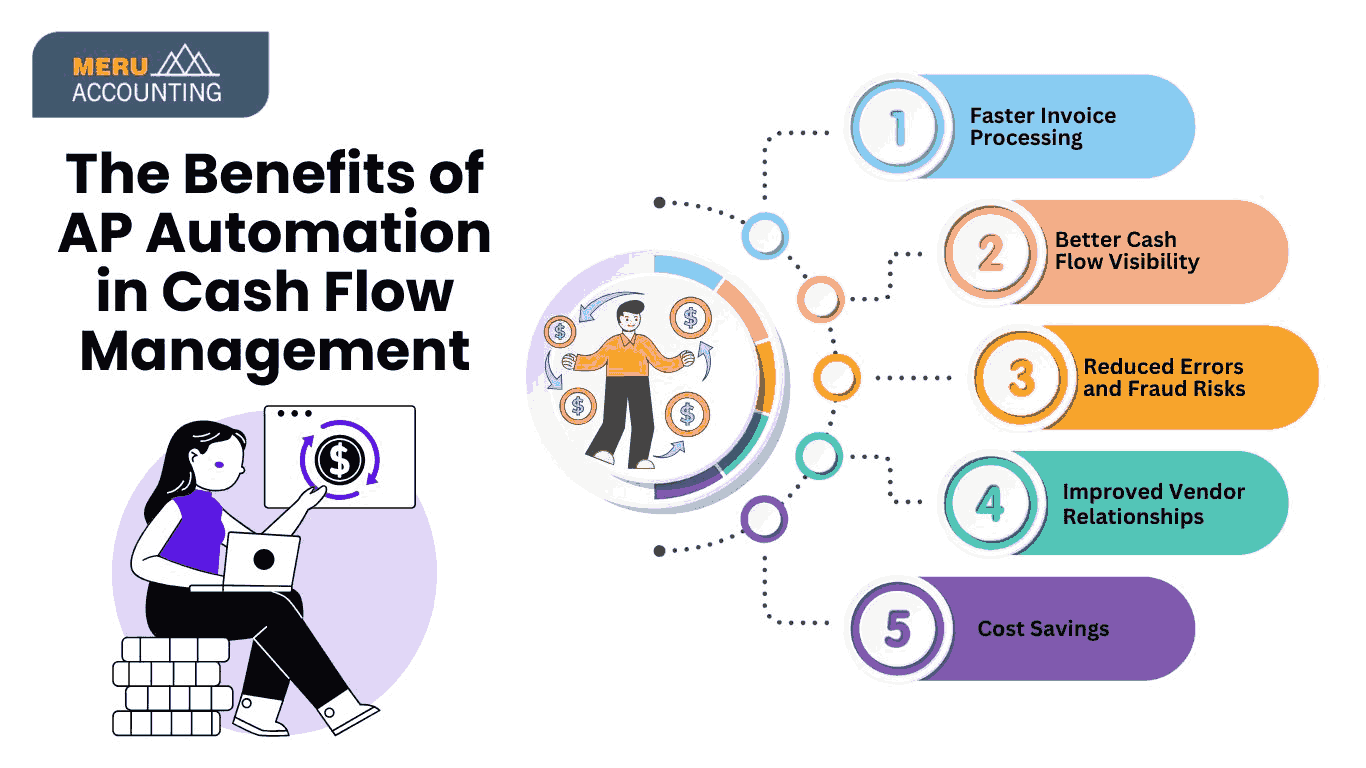
Role of Accounts Payable in Cash Flow Management
Hire A Dedicated Team
That Grows With You, Flexible, Scalable and
Always On Your Side

Best Practices for Managing Accounts Payable
AP automation plays an important role in optimizing cash flow management. It reduces manual work and minimizes errors. Faster processing also helps avoid late fees and improve vendor relationships.
- Maintain an Organized AP Process: Keeping invoices, payment schedules, and vendor details organized helps prevent missed payments and reduces errors.
- Implement AP Automation: Using AP automation streamlines invoice processing, reduces human error, and speeds up payments, improving overall efficiency.
- Review Payment Terms Regularly: Negotiating better payment terms with vendors can provide flexibility and improve cash flow.
- Monitor AP Aging Reports: Reviewing aging reports helps track due payments and ensures that invoices are paid on time.
- Avoid Unnecessary Spending: Controlling expenses and reducing excessive spending can help maintain positive cash flow.
- Reconcile Accounts Payable Frequently: Regular reconciliation ensures that all invoices and payments match correctly, preventing discrepancies.
The Benefits of AP Automation in Cash Flow Management
AP automation plays an important role in optimizing cash flow management. It reduces manual work and minimizes errors. Faster processing also helps avoid late fees and improve vendor relationships.
- Faster Invoice Processing: Automating the AP process speeds up invoice approvals and payments, reducing delays in cash flow.
- Better Cash Flow Visibility: AP automation provides real-time insights into outstanding liabilities, helping businesses plan finances better.
- Reduced Errors and Fraud Risks: Manual AP processes can lead to mistakes or fraudulent transactions, but automation helps detect anomalies.
- Improved Vendor Relationships: Prompt payments and efficient handling of invoices lead to stronger vendor relationships and potential cost savings.
- Cost Savings: Automating AP processes reduces administrative costs and improves operational efficiency.
Key Metrics to Monitor in Accounts Payable for Better Cash Flow
Monitoring certain key metrics in accounts payable helps improve cash flow management. It helps businesses track expenses and avoid late payments.
1. Days Payable Outstanding (DPO)
- Measures the average time a business takes to pay its vendors.
- A higher DPO improves cash flow but should be balanced with vendor relationships.
2. Accounts Payable Turnover Ratio
- Indicates how effectively a company manages supplier payments.
- A high ratio means timely payments, while a low ratio may indicate cash flow issues.
3. Outstanding Payables
- Tracking the total amount due helps businesses plan for upcoming expenses.
4. Invoice Processing Time
- Measures the average time taken to process invoices.
- Faster processing leads to better cash flow management.
5. Early Payment Discounts Utilization
- Evaluate how often a business takes advantage of early payment discounts.
- Helps in cost savings and better cash flow planning.
How Accounts Junction Helps Optimize Accounts Payable and Cash Flow Management
Accounts Junction offers expert accounting services to help businesses optimize accounts payable and cash flow management.
- Accounts Junction offers expert accounting services to help businesses optimize accounts payable and cash flow management.
- Efficient AP Automation Solutions: We implement the best AP automation tools to streamline invoice processing and payments.
- Cash Flow Forecasting and Analysis: Our team provides detailed cash flow forecasting to help businesses plan their finances better.
- Vendor Payment Optimization: We assist in negotiating better payment terms with vendors to improve cash flow.
- Compliance and Risk Management: We ensure businesses stay compliant with regulations and avoid late payment penalties.
- Expense Tracking and Control: Our solutions help businesses track expenses efficiently and prevent overspending.
- Fraud Prevention: We implement secure AP processes to reduce fraud risks and ensure financial security.
- Multi-Currency and Global Payments Support: We help businesses manage international transactions and optimize cross-border payments.
- Integration with Accounting Software: Our services seamlessly integrate with leading accounting platforms for better financial management.
- Custom AP Strategies: We design tailored accounts payable strategies based on business needs for maximum efficiency.
Conclusion
By efficiently managing accounts payable, businesses can ensure strong cash flow, financial stability, and long-term success. With AP automation and expert services from Accounts Junction, companies can simplify their finances and focus on growth. It reduces errors and saves time. Better AP management also helps in planning expenses and avoiding cash shortages. Accounts Junction provides customized AP solutions to improve efficiency and financial control.
FAQs
1. How do accounts payable affect cash flow?
Ans: Accounts payable impacts cash flow by determining when and how much cash is used to pay suppliers. Proper management ensures liquidity and financial stability.
2. What are the benefits of AP automation for cash flow management?
Ans: AP automation improves cash flow by reducing processing time, avoiding late fees, and providing real-time insights into liabilities.
3. How can businesses optimize accounts payable?
Ans: Businesses can optimize accounts payable by implementing AP automation, negotiating better payment terms, tracking key metrics, and ensuring timely payments.
4. What role does Accounts Junction play in AP management?
Ans: Accounts Junction helps businesses streamline AP processes, automate workflows, and improve cash flow management through expert financial services.
5. What are some key metrics to monitor in accounts payable?
Ans: Important metrics include Days Payable Outstanding (DPO), AP turnover ratio, outstanding payables, invoice processing time, and early payment discount utilization.
Understanding Accounts Payable and Cash Flow Management
Accounts payable (AP) is a crucial part of any business's financial operations. It represents the money a company owes to suppliers and vendors for goods or services received but not yet paid for. Managing accounts payable effectively ensures smooth cash flow management, which is essential for maintaining a healthy business.
When businesses make their accounts payable process better they can manage cash flow well, avoid late fees and create good relationships with vendors. By implementing best practices and utilizing AP automation, companies can ensure they have better financial stability and improved operational efficiency.
How Accounts Payable Impacts Cash Flow
Proper accounts payable management has a direct effect on a company’s cash flow. A business's AP process impacts cash flow. It ensures there is enough money to cover expenses and invest in growth. Below are some ways accounts payable influences cash flow management:
- Timely Payments: Paying invoices on time builds good vendor relationships and avoids penalties. Delaying payments wisely can free up cash for other needs.
- Cash Flow Forecasting: Tracking AP liabilities helps businesses anticipate upcoming expenses and plan for them accordingly.
- Negotiating Payment Terms: Extending payment deadlines with suppliers can improve cash flow while still maintaining trust and credibility.
- Reducing Unnecessary Expenses: Efficient AP processes help identify and eliminate duplicate or erroneous payments, preventing cash leakage.
- Utilizing Discounts: Many vendors offer discounts for early payments, which can reduce costs and positively impact cash flow.

Hire A Dedicated Team
That Grows With You, Flexible, Scalable and
Always On Your Side

Best Practices for Managing Accounts Payable
AP automation plays an important role in optimizing cash flow management. It reduces manual work and minimizes errors. Faster processing also helps avoid late fees and improve vendor relationships.
- Maintain an Organized AP Process: Keeping invoices, payment schedules, and vendor details organized helps prevent missed payments and reduces errors.
- Implement AP Automation: Using AP automation streamlines invoice processing, reduces human error, and speeds up payments, improving overall efficiency.
- Review Payment Terms Regularly: Negotiating better payment terms with vendors can provide flexibility and improve cash flow.
- Monitor AP Aging Reports: Reviewing aging reports helps track due payments and ensures that invoices are paid on time.
- Avoid Unnecessary Spending: Controlling expenses and reducing excessive spending can help maintain positive cash flow.
- Reconcile Accounts Payable Frequently: Regular reconciliation ensures that all invoices and payments match correctly, preventing discrepancies.
The Benefits of AP Automation in Cash Flow Management
AP automation plays an important role in optimizing cash flow management. It reduces manual work and minimizes errors. Faster processing also helps avoid late fees and improve vendor relationships.
- Faster Invoice Processing: Automating the AP process speeds up invoice approvals and payments, reducing delays in cash flow.
- Better Cash Flow Visibility: AP automation provides real-time insights into outstanding liabilities, helping businesses plan finances better.
- Reduced Errors and Fraud Risks: Manual AP processes can lead to mistakes or fraudulent transactions, but automation helps detect anomalies.
- Improved Vendor Relationships: Prompt payments and efficient handling of invoices lead to stronger vendor relationships and potential cost savings.
- Cost Savings: Automating AP processes reduces administrative costs and improves operational efficiency.
Key Metrics to Monitor in Accounts Payable for Better Cash Flow
Monitoring certain key metrics in accounts payable helps improve cash flow management. It helps businesses track expenses and avoid late payments.
1. Days Payable Outstanding (DPO)
- Measures the average time a business takes to pay its vendors.
- A higher DPO improves cash flow but should be balanced with vendor relationships.
2. Accounts Payable Turnover Ratio
- Indicates how effectively a company manages supplier payments.
- A high ratio means timely payments, while a low ratio may indicate cash flow issues.
3. Outstanding Payables
- Tracking the total amount due helps businesses plan for upcoming expenses.
4. Invoice Processing Time
- Measures the average time taken to process invoices.
- Faster processing leads to better cash flow management.
5. Early Payment Discounts Utilization
- Evaluate how often a business takes advantage of early payment discounts.
- Helps in cost savings and better cash flow planning.
How Accounts Junction Helps Optimize Accounts Payable and Cash Flow Management
Accounts Junction offers expert accounting services to help businesses optimize accounts payable and cash flow management.
- Accounts Junction offers expert accounting services to help businesses optimize accounts payable and cash flow management.
- Efficient AP Automation Solutions: We implement the best AP automation tools to streamline invoice processing and payments.
- Cash Flow Forecasting and Analysis: Our team provides detailed cash flow forecasting to help businesses plan their finances better.
- Vendor Payment Optimization: We assist in negotiating better payment terms with vendors to improve cash flow.
- Compliance and Risk Management: We ensure businesses stay compliant with regulations and avoid late payment penalties.
- Expense Tracking and Control: Our solutions help businesses track expenses efficiently and prevent overspending.
- Fraud Prevention: We implement secure AP processes to reduce fraud risks and ensure financial security.
- Multi-Currency and Global Payments Support: We help businesses manage international transactions and optimize cross-border payments.
- Integration with Accounting Software: Our services seamlessly integrate with leading accounting platforms for better financial management.
- Custom AP Strategies: We design tailored accounts payable strategies based on business needs for maximum efficiency.
Conclusion
By efficiently managing accounts payable, businesses can ensure strong cash flow, financial stability, and long-term success. With AP automation and expert services from Accounts Junction, companies can simplify their finances and focus on growth. It reduces errors and saves time. Better AP management also helps in planning expenses and avoiding cash shortages. Accounts Junction provides customized AP solutions to improve efficiency and financial control.
FAQs
1. How do accounts payable affect cash flow?
Ans: Accounts payable impacts cash flow by determining when and how much cash is used to pay suppliers. Proper management ensures liquidity and financial stability.
2. What are the benefits of AP automation for cash flow management?
Ans: AP automation improves cash flow by reducing processing time, avoiding late fees, and providing real-time insights into liabilities.
3. How can businesses optimize accounts payable?
Ans: Businesses can optimize accounts payable by implementing AP automation, negotiating better payment terms, tracking key metrics, and ensuring timely payments.
4. What role does Accounts Junction play in AP management?
Ans: Accounts Junction helps businesses streamline AP processes, automate workflows, and improve cash flow management through expert financial services.
5. What are some key metrics to monitor in accounts payable?
Ans: Important metrics include Days Payable Outstanding (DPO), AP turnover ratio, outstanding payables, invoice processing time, and early payment discount utilization.
